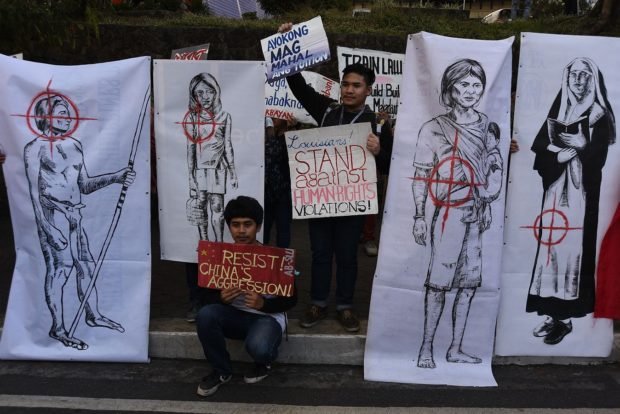
STUDENTS’ VOICE: In this file photo, student activists in Baguio City join a street protest to raise different issues, such as tuition increase, human rights violation and Chinese incursion in Philippine waters. (Photo by EV ESPIRITU / Philippine Daily Inquirer)
MANILA, Philippines — A rights advocate group has doubted whether human rights would be respected while implementing an anti-insurgency program in the Cordillera as it was molded after the controversial house-to-house anti-drug program, Oplan Tokhang.
According to Karapatan, even the assurance from Philippine National Police (PNP) chief Gen. Guillermo Eleazar — that any assistance is given to the Cordillera Regional Peace and Order Council for “dumanun makitungtong” would only be within the realm of human rights — fails to provide any relief.
Last Tuesday, Eleazar assured the public that the police would help in the tokhang-style counter-insurgency campaign, where authorities would visit the homes of leftist group members — just like in Oplan Tokhang, which is literally a Visayan word meaning “to knock and plead”.
“PNP Chief Guillermo Eleazar’s changing pronouncements, from seeming to discourage the regional body not to use tokhang, to saying it appreciates the resolution, thereby supporting it, also goes to show that they are having a hard time sugarcoating their policies,” Karapatan secretary general Cristina Palabay said in a statement.
“Their statements to ‘respect human rights does not give any relief either, as they continue to go all-out in malicious red-tagging and disrespect of the rights of people,” she added.
Palabay claimed that whatever name is given to the program, the visits would still present a problem as simple visits may result to illegal arrests and planting of evidence.
“Whether tokhang or ‘dumanun makitungtong,’ the core of these ‘house-to-house visits’ remain, that anybody who is a suspected member or supporter may be listed and subject to such visits,” she said.
“Who knows what can happen in those visits, even if they claim that they will only engage in talking? With a police force set to arrest without warrant, implement questionable search warrants, file trumped-up charges and plant evidence, anything could happen in such visits,” she added.
According to Eleazar, they appreciate the efforts of the Cordillera Regional Peace and Order Council as they try to end the decades-long problem of communist insurgency in the country.
Oplan Tokhang is the police’s anti-drug campaign during the early part of President Rodrigo Duterte’s administration, where officers would visit homes of people accused of being involved in the drug trade.
The program however was criticized for its bloody implementation due to the brutal killings carried out by police allegedly without consideration of the rights of the suspects, who would thereafter be called “nanlaban” (or fought back to resist police arrest).
The Duterte drug war had called the attention of the international community, and even prompted even Vice President Leni Robredo, then the chair of the Inter-Agency Committee Against Illegal Drugs, to suggest that the program be junked.
Such operations, Karapatan said, should not even take flight.
“By whatever name, any resolution initiating and driving activities that have the notorious tokhang-style operation in their backbone shall remain a threat to people’s safety and security in Cordillera, and must be widely opposed and junked,” Palabay said.
“Dropping the word tokhang will not lessen the threats against persons who will be the subject of operations of state forces in the Cordillera, when the nature and character of the operations bear the tokhang imprints,” she added.
Karapatan is one of the groups that have sustained heavy red-tagging, due to their perceived support for communist rebels. However, the group has maintained that red-tagging is only used to silence dissent, as they have been active in calling out the spate of killings and abuses that happened under Duterte’s watch.
As for the government, it appeared once that peace negotiations between the communist rebels and the Duterte administration were gaining steam, in consideration of the President’s former links to the communist groups.
But mistrust between the communist forces and President Duterte’s troops led to even more heightened skirmishes and operations between the two sides, even in the midst of the COVID-19 pandemic.